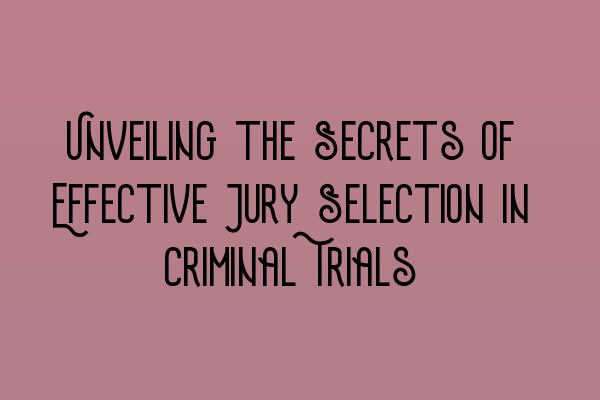Unveiling the Secrets of Effective Jury Selection in Criminal Trials
Welcome to SQE Criminal Law & Practice Law UK, your trusted source for expert advice on criminal law matters. In today’s blog post, we will be unveiling the secrets of effective jury selection in criminal trials. The role of a jury in a criminal trial cannot be underestimated. A carefully selected and impartial jury can make a significant difference in the outcome of a case.
Why Jury Selection Matters
Before we dive into the secrets, let’s understand why jury selection is crucial. A jury consists of a group of individuals chosen from the community to hear the evidence and make a fair and impartial judgment. The goal of the defense and prosecution is to select jurors who are likely to be fair and unbiased, as their decision will ultimately determine the fate of the accused.
Jury selection involves a series of steps aimed at assessing prospective jurors’ ability to objectively evaluate the evidence and apply the law. The process requires a deep understanding of human psychology, critical thinking, and effective communication. By strategically selecting jurors, lawyers can shape the perception of the case, influence the jury’s decision-making, and increase the chances of a favorable outcome for their clients.
Key Factors to Consider
When conducting jury selection, lawyers must consider several key factors:
- Demographics: Age, gender, race, occupation, and socioeconomic background can influence juror biases and perspectives. Understanding the demographics of the potential jurors can help lawyers tailor their arguments to resonate with specific groups.
- Personal Beliefs: Jurors’ personal beliefs, values, and experiences can impact their interpretation of the evidence. Identifying and exploring these beliefs during the selection process can help lawyers uncover potential biases.
- Attitudes Toward Law Enforcement and the Criminal Justice System: Jurors with strong opinions about the police or the criminal justice system may be more inclined to favor the defense or prosecution. Assessing jurors’ attitudes in this regard is vital.
- Communication Styles: Different jurors may respond more favorably to certain styles of communication. Lawyers should consider their ability to effectively communicate complex legal concepts to jurors with varying educational backgrounds.
The Secrets Revealed
Now that we’ve covered the key factors to consider during jury selection, let’s unveil the secrets that can enhance your effectiveness in this crucial process:
- Thorough Preparation: Take the time to thoroughly research potential jurors. Use available resources to gather information about their backgrounds, interests, and social media presence. This knowledge can help identify potential biases and inform your questioning strategies.
- Strategic Questioning: Craft questions that go beyond surface-level responses. Uncover jurors’ hidden biases, preferences, and potential conflicts of interest. Use open-ended questions to encourage thoughtful responses and gain insights into their perspectives.
- Active Listening: Pay close attention to juror responses and body language during the questioning process. Non-verbal cues can reveal valuable information about jurors’ attitudes and level of engagement.
- Building Rapport: Establishing a positive rapport with jurors can help create a favorable impression and enhance their receptiveness to your arguments. Stay respectful, empathetic, and attentive throughout the selection process.
By implementing these secrets, you can significantly increase your chances of selecting a jury that is sympathetic to your client’s case.
Conclusion
Jury selection is an art that requires a keen understanding of human behavior, effective communication skills, and rigorous preparation. By carefully considering key factors, employing strategic questioning techniques, and building rapport with potential jurors, lawyers can enhance their ability to select an impartial and favorable jury. Remember, the composition of the jury can make or break a case, so invest the time and effort in mastering the secrets of effective jury selection.
For more information on criminal law matters, legal representation for Delaware LLCs in the UK, legal challenges for UK businesses in the U.S., SQE exam preparation materials, and expert testimonies in UK courts, be sure to check out our related articles:
- Legal Representation for Delaware LLCs in the UK: Expert Advice
- Legal Challenges for UK Businesses in the U.S.: Strategies for Overcoming Hurdles
- Legal Challenges for UK Businesses in the U.S.: Strategies for Overcoming Hurdles
- SQE Exam Prep: Essential Study Materials for Aspiring Solicitors
- Expert Testimonies in UK Courts: Building Strong Cases
Thank you for reading our blog post on effective jury selection in criminal trials. We hope you’ve gained valuable insights. If you have any questions or need expert legal advice, feel free to reach out to us at SQE Criminal Law & Practice Law UK. Our team of experienced solicitors is here to assist you.
